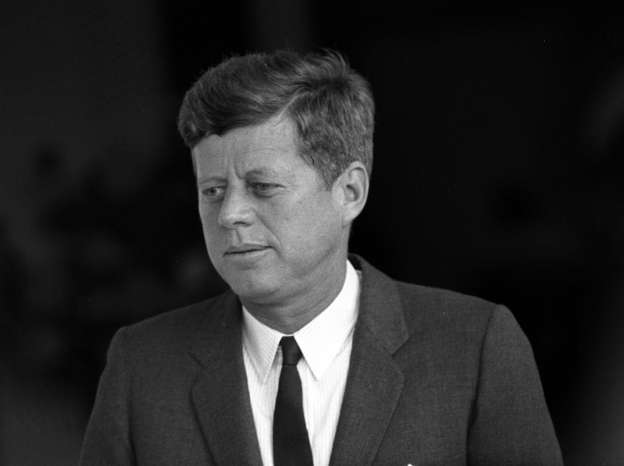 © Getty Images Former American President John F Kennedy.
© Getty Images Former American President John F Kennedy.
A reporter on the UK’s Cambridge Evening News received an anonymous call telling him to ring the US embassy for some big news, 25 minutes before the murder of John F Kennedy in Dallas, newly released documents say.
A memo written to the director of the FBI from the deputy director (Plans) of the CIA tells of the strange phone call made to the unnamed senior reporter on the paper.
Dated four days after the president’s death, it reveals how far the investigation into the events in Dallas reached.
The memo reads: “The British security service (MI-5) has reported that at 18:05 GMT on 22nd November an anonymous telephone call was made in Cambridge, England, to the senior reporter of the Cambridge News.
“The caller said only that the Cambridge News reporter should call the American embassy in London for some big news and then hung up.
“After the word of the president’s death was received the reporter informed the Cambridge police of the anonymous call and the police informed MI-5.
“The important point is that the call was made according to MI-5 calculations, about 25 minutes before the president was shot. The Cambridge reporter had never received a call of this kind before and MI-5 state that he is known to them as a sound and loyal person with no security record.”
(November 22, 1963)
President John F Kennedy is shot dead by a sniper while his motorcade moved through Dallas. Lee Harvey Oswald, a former US marine and Soviet defector, is arrested.
(November 24, 1963)
Oswald is shot dead by a Dallas nightclub owner, Jack Ruby.
(November 29, 1963)
The newly sworn in president, Lyndon Johnson, orders an investigation of the assassination, named after its leader, chief justice Earl Warren.
(September 28, 1964)
The Warren Commission determines that Oswald acted alone, without help from Cuba or Russia. The panel also finds that Ruby acted alone.
(January 17, 1969)
A new investigation by four medical experts reaffirms the commission’s finding that two bullets killed Kennedy from behind.
(March 2, 1969)
Clay Shaw, a New Orleans businessman, is acquitted of charges of conspiracy in Kennedy’s murder, after 50 minutes of deliberation. He is the only person prosecuted over the assassination.
(July 17, 1979)
After two years of investigation, a House committee accuses previous investigators of failing to explore sufficient leads. The panel found it “likely” that conspiracies were behind Kennedy’s murder, including a possible second gunman on “the grassy knoll” in Dallas. The committee also believed organized crime was “probably” involved.
(December 20, 1991)
Oliver Stone premieres JFK, his film about the Shaw trial and the possibility of a CIA conspiracy, motivated in part to keep the US in Vietnam. A few months later, Seinfeld parodies the elaborate conspiracy theorizing around the Zapruder film and “magic bullet” theory.
(October 26, 1992)
Congress enacts the JFK Records Collection Act and orders the release of 3,100 secret documents in an attempt to quash conspiracy theories. The documents are ordered released with a 25-year deadline.
(May 3, 2016)
Donald Trump accuses the father of Ted Cruz of involvement in the assassination. He cites the National Enquirer, a tabloid, as his source.
The memo somewhat cryptically also states that “similar anonymous phone calls of a strangely coincidental nature have been received by persons in the UK over the past year” particularly in the case of a Dr Ward.
It ends: “The British Security Service stated its desire to assist in every way possible on any follow-up investigations required within the United Kingdom.”
The memo is signed by the deputy director James Angleton.
Kennedy was assassinated as his motorcade passed through Dallas on 22 November 1963. Lee Harvey Oswald, a former US marine, was charged with his murder. Oswald himself was shot dead two days later by nightclub owner Jack Ruby.
Related: This timeline shows exactly how the day of JFK’s assassination unfolded (Provided by Business Insider)

No comments:
Post a Comment